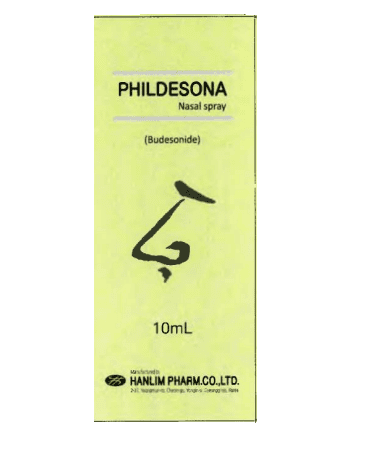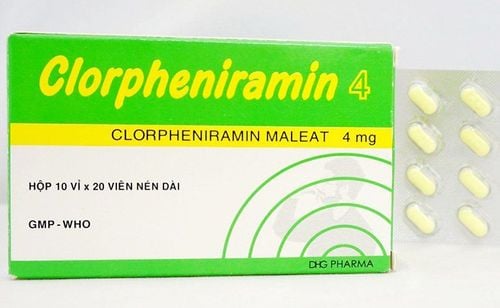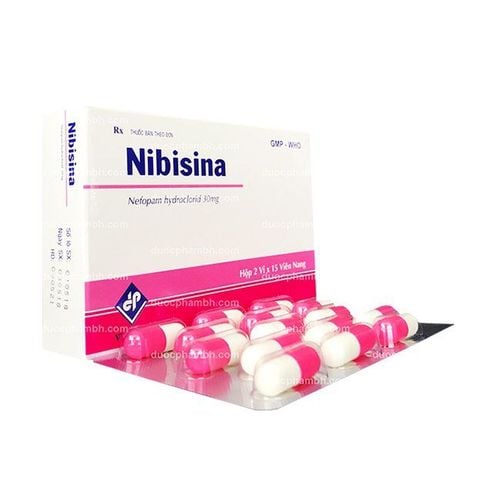This is an automatically translated article.
Meclonate with the active ingredient Beclomethasone propionate, is used to prevent and treat diseases: allergic rhinitis, rhinitis caused by vasomotor disorders or to help prevent recurrence of nasal polyps after surgery. The following article will give you more information about some of the uses of the drug.
1. What is Meclonate?
Meclonate is an anti-inflammatory corticosteroid drug, prepared in the form of a nasal spray suspension, with the main ingredient being Beclomethasone dipropionate. Beclomethasone is a synthetic glucocorticoid with potent anti-inflammatory effects. When you spray it into your nose, Meclonate goes straight into the lungs, with a very small part going to other organs of the body.
Therefore, Meclonate (Beclomethasone) has fewer side effects, used topically, so the anti-inflammatory effect is many times stronger than when you use other oral glucocorticoids such as hydrocortisone,...
Muscle Meclonate mechanism of action:
Meclonate (Beclomethasone dipropionate) is a halogen corticoid with strong glucocorticoid effects and weak mineralocorticoid effects. Following topical administration, beclomethasone dipropionate exerts anti-inflammatory and vasoconstrictive effects. Thereby, helping to significantly improve the common symptoms in allergic rhinitis or rhinitis caused by vasomotor disorders such as sneezing, runny nose, runny nose, itchy nose,... Beclomethasone dipropionate is a prodrug. with a weakly bound glucocorticoid receptor. It is hydrolyzed by the enzyme esterase to produce the active metabolite beclomethasone - 17 - monopropionate (B-17-MP), which has high local anti-inflammatory potency. Pharmacokinetics of Meclonate:
Meclonate (Beclomethasone dipropionate) is sparingly soluble in water. When using nasal inhalers in the form of a solution or aerosol suspension, Meclonate will be deposited mainly inside the nasal cavity. Eventually, most of the drug will be swallowed. After nasal spray of Meclonate (Beclomethasone dipropionate), the drug will be absorbed and converted to B-17-MP, an active and effective metabolite, only 44% of the drug is absorbed in the nasal passages, of which 43% of the dose is absorbed through the swallowed portion and only 1% of the total dose is absorbed through the nasal mucosa.
2. Uses of the drug Meclonate
Meclonate is commonly used in the following cases:
People with seasonal or year-round allergic rhinitis, vasomotor rhinitis: Use Meclonate to help prevent and treat. People after surgery to remove nasal polyps: Use Meclonate to help prevent recurrence.
3. Dosage - How to use Meclonate
How to use:
The drug is used by nasal spray.
When using the medicine for the first time or if you have not used it for a few days, you need to spray the “primer” by pressing the pump a few times until the level of mist is even (about 8-10 times). If the spray head does not spray, you should check it again, because it may be clogged. Then you need to clean it by rinsing the spray head to remove the clogged part. Do not open the injector by yourself with a needle or other sharp object, as this may damage the spray tip, rendering the vial unusable. How to spray Meclonate:
Blow your nose clean. Shake the bottle well. Open the hood. Hold the vial of Meclonate straight up. Place the tip of the spray head into the nostril and pump according to the dose prescribed by your doctor. Inject the same medication into the other nostril. After use, wipe the spray head with a clean tissue or handkerchief, and then close the cap. Clean the nozzle: Clean the nozzle at least once a week or more often if it is clogged. Dosage:
According to the manufacturer's recommendations, the dosages used for the subjects are as follows:
Adults and children over 6 years old: Spray 2 times in each nostril, 2 times per day (400 ug) /day), in the morning and in the evening. The maximum total daily dose should not exceed 400 ug/day. If after 3 weeks of treatment you still do not see any improvement, you should stop taking Meclonate and see your treating doctor to examine and re-evaluate your current medical condition to come up with a suitable treatment plan. . Children under 6 years of age: There is still not enough specific evidence about the safety level for children, so it is not recommended for use. Note: The specific dose will depend on your condition, condition and progression of the disease, so you need to consult a specialist or medical professionals for advice and recommendations. the dosage regimen that works best for you. You also need to strictly follow the instructions of your doctor, do not change the dose on your own. That not only enhances the effectiveness of treatment, but also makes the treatment difficult to control, affecting your own health and the effectiveness of the treatment process.
4. Undesirable effects of the drug Meclonate
When using Meclonate medicine, you may have some of the following unwanted effects:
Symptoms that you may experience immediately after nasal spray:
Sneezing more. Unpleasant smell or taste. Most of these symptoms will go away quickly after you use the medicine. If symptoms persist longer, you need to immediately notify your treating doctor for specific advice and instructions.
Common unwanted effects:
On the immune system: may cause some hypersensitivity reactions manifested through symptoms such as: rash, urticaria, rash, ... On nerves: taste disorders (bad taste,...), olfactory disturbances (unpleasant odors,...) On the respiratory tract, chest and mediastinum: nosebleeds, dry nose, itchy nose, throat dry, thirsty accompanied by itchy throat,... Rare adverse effects:
On the immune system: Causes some more severe hypersensitivity reactions including angioedema, dyspnoea and/or bronchospasm. management, anaphylaxis, .. If during the use of Meclonate, you have the above symptoms, you should immediately stop the drugs you are using and contact 911 emergency center, or immediately go to medical facilities. nearest medical facility for timely guidance and treatment. On the eyes: May cause symptoms of: Glaucoma, increased eye pressure, cataracts, or some other eye problems. On respiratory, thoracic and mediastinal: Causes perforation of the nasal septum. In the course of using the drug, if you appear one of the above symptoms, or appear any other unwanted symptoms, not mentioned, you need to immediately stop using Meclonate and all other drugs. medication being taken. Then, immediately inform your treating doctor about your current condition, medications (prescription, over-the-counter, or supplements and other drugs, ..) that you are taking. used, so that doctors can understand, give appropriate and timely advice, guidance and treatment.
5. Notes during the use of Meclonate.
Meclonate should not be used in the following cases, due to contraindications:
You have a history or symptoms of hypersensitivity to any of the ingredients in the drug Meclonate. Cases of pulmonary tuberculosis: with both active or latent forms. The process of taking Meclonate should be cautious with patients who are experiencing the following problems:
People who are taking oral corticosteroids and want to switch to Meclonate spray. Especially for patients who require frequent corticosteroid use such as asthma, COPD, or other medical conditions, too rapid reduction in oral corticosteroid intake can cause exacerbation of the disease. that reason. Pregnancy: Currently, there is no adequate evidence of safety for women during pregnancy. Therefore, only use Meclonate (Beclomethasone dipropionate) when absolutely necessary. Some clinical studies show that, in mothers who use corticosteroids during pregnancy, the baby may be born with adrenocortical insufficiency syndrome, also known as the nonteratogenic effect. Therefore, you should carefully weigh the benefits and risks, consult a specialist before starting to use Meclonate. Lactation: Caution should be exercised in patients with recent nasal septal ulceration, nasal surgery, nasal trauma: Due to the inhibitory effect of corticosteroids on the wound healing process, patients who are experiencing In this condition, corticosteroids should not be used on the nose until the wound has healed. Local fungal infections or irritation of the nasopharyngeal mucosa: In clinical studies using intranasal beclomethasone dipropionate, the development of local infections of the nose and pharynx due to Candida albicans has occurred, but is rare. meet. Therefore, when there are signs of a fungal infection in the nose and throat, you need to stop taking the medicine and immediately notify your treating doctor. Caution should be exercised when using Meclonate in patients such as patients with respiratory tuberculosis, systemic fungal, bacterial or viral infections or herpes simplex eye infections.
6. Meclonate . Interactions
During the use of Meclonate may occur interactions with some of the following drugs:
Ritonavir: Clinically, there have been cases of patients developing Cushing's syndrome, when that patient was treated with inhaled fluticasone. and concomitant use with ritonavir. Because Ritonavir has the ability to inhibit the metabolism of corticosteroids (including Beclomethasone) in the liver. Therefore, the manufacturer, also recommends, not to use the combination of Meclonate with ritonavir, to avoid unexpected interactions. Above is some information about the uses of Meclonate, if you need advice or have any questions, please consult a qualified doctor/pharmacist for answers.
Follow Vinmec International General Hospital website to get more health, nutrition and beauty information to protect the health of yourself and your loved ones in your family.
Please dial HOTLINE for more information or register for an appointment HERE. Download MyVinmec app to make appointments faster and to manage your bookings easily.













